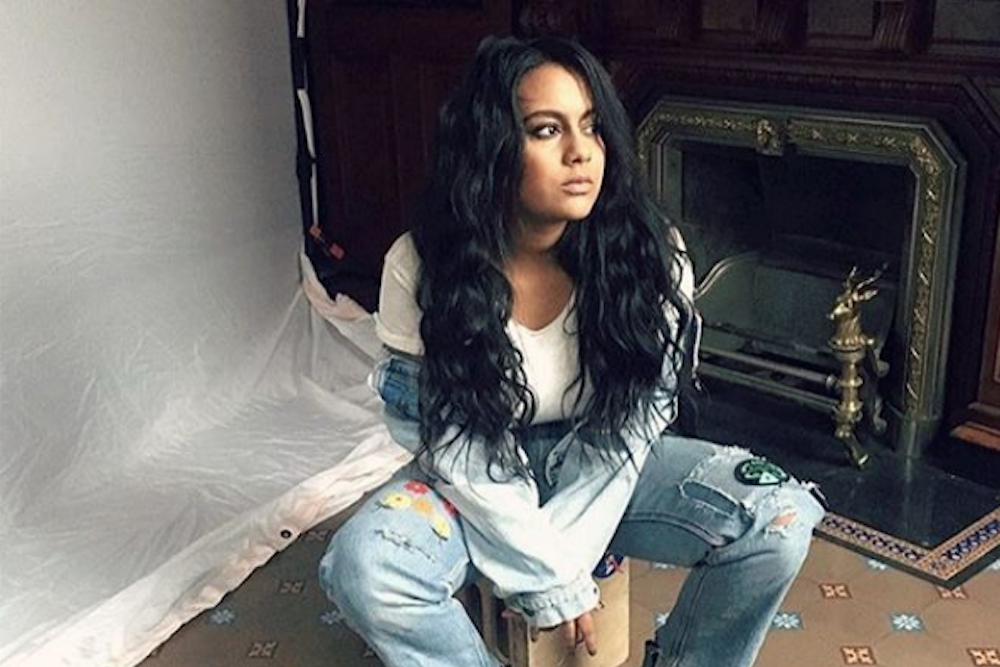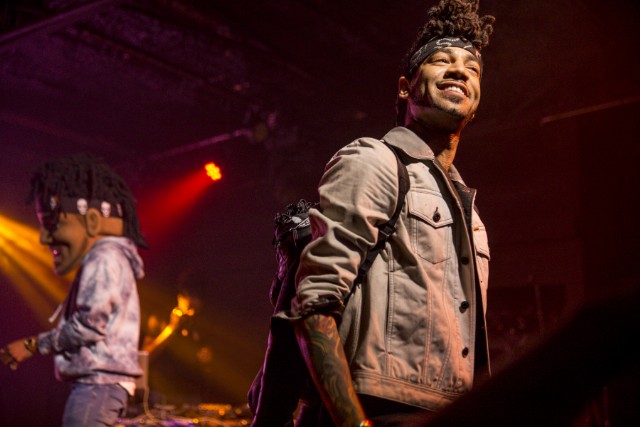Berlin transplant Bibi Bourelly’s career is off to an auspicious start. She’s already performed on The Tonight Show and The Late Late Show and is prepping to open up for sibling pop-rock trio HAIM in the next few weeks. Her label, Def Jam, has a habit of pumping out releases from its new talent: Rapper Vince Staples put out an EP and an album within two years of his signing and “Here” singer Alessia Cara dropped her LP the year after she signed to the label.
But it isn’t being signed to Def Jam or the success of her young labelmates that’s given Bourelly her unshakeable confidence. She believes she was born to make music.
“When you create music, and that’s your purpose — what you were born and made to do — you just hear s**t all the time,” Bourelly, 21, says. “You don’t consciously listen to something for inspiration. There’s too many songs going on in my own brain all the time for me to f**king try to pull inspiration from something else.”
Bourelly spent the evening of May 6 — the day her debut EP, Free the Real, dropped — at the basement of the Williamsburg Savings Bank. After two hip-hop performances and a DJ set by Kitty Cash, Bourelly, backed by three scrawny bros, took the stage. Her frank personality came through between songs: The Los Angeles-based singer said she was relieved to perform in front of young music fans instead of men in suits and promised that after this short set, “I’ma get drunk as f**k.”
Most of Bourelly’s singing contemporaries have voices that rest on airiness and dulcet tones; hers relies on pure volume and visceral blues. As she ran through her singles — including the grimy, saloon-style number “Sally” and the f**k-off anthem “Ego” — and a short cover of Gavin DeGraw’s “I Don’t Want To Be,” she vacillated between vulnerable crooning to riotous howling. Her theatrics excited the crowd, who raised their middle fingers in unison near the beginning of “Ego.”
Although her bluntness is best experienced live, Bourelly’s savvy yet simplistic hooks make the five-track Free The Real a worthy listen. On record, as on stage, the words tumble from her throat in all caps. Over the phone a few days after the show, she says that her passionate delivery comes from personal experiences — not just broken romantic relationships, but also serious loss; her mother died of cancer when Bourelly was 6.
“I have faith in the people. Honesty will prosper,” the singer/songwriter says. “I’m just trying to give the world something pure for a change. We’ll see what happens. I don’t want to, like, force myself down anyone’s throat. I’m just over here making s**t.”
Bourelly first became known as the songwriter behind Rihanna’s “Bitch Better Have My Money” and ANTI highlight “Higher,” in addition to being the featured vocalist on Usher’s attempted protest anthem, “Chains.” But with more than 300 songs written and a personality that hews closer to that of Chrissie Hynde than a behind-the-scenes scribe, she’s much more than a pop understudy.
In her quest to prove that, Bourelly has spent the past few weeks going through the rigorous promo run that’s typical for major-label-backed debuts. She’s been performing in front of corporate personnel, doing interviews, and retelling her life story: how she grew up in an artistic family where her father — guitarist Jean-Paul Bourelly, who makes an appearance on Free The Real‘s “Guitar” — played the sounds of A Tribe Called Quest and Erykah Badu (“jazz s**t,” Bourelly says); how she’s been writing songs since she was a toddler, so a career in music seemed like a natural fit; and how her grades were so bad that the only way she could continue high school was by moving to Maryland. College wasn’t an option.
“I was a grown-ass, 18-year-old girl at that time. Like, what are you gonna do? Put me in a box and ship me off to college?” Bourelly says. “[My family] wanted me to be successful. They wanted me to go on to have options in life, but they didn’t want to pull me away from something I was so passionate about. They saw how dead set I was on pursuing music.”
Bourelly’s breakthrough came in 2014 when she moved to L.A. There, Paperboy Fabe, a Grammy-nominated producer who Bourelly met online, booked her studio time with Kanye West. West linked her with Rihanna, and “Higher” and “Bitch Better Have My Money” were born. Songwriters wait decades for that sort of kismet, so Bourelly’s blessings aren’t lost on her: “At 19 years old, a failing high school student had a single with the biggest pop artist in the world.”
High-profile songwriting credits aside, Bourelly’s attitude might make her seem rebellious for the sake of being rebellious. But Bourelly argues that’s not quite the case: She merely seeks to be herself, which is a rebellious act within an industry that favors marketability over artistry. She’s not too different from some of her peers in that regard; 19-year-old Atlanta singer Raury rose to prominence with the idea that his sunhat, acoustic guitar, and be-yourself platitudes are merely expressions of his truest self. They’ve both become labeled as “rebels” and “outsiders” because they’re harder to compartmentalize, performing music that transcends easy racial distinctions — e.g. black woman equals R&B by default.
“The only thing I can control is myself,” Bourelly says. “I can’t control what anyone thinks about me, I can’t control circumstance, I can’t control the things that God controls.”
Bourelly admits she doesn’t quite have an end goal for her music career — whether she wants to become a top-flight pop star or a hero with a cult fanbase. For now, she’s focused on maximizing her current spotlight while remaining Bibi Bourelly. “You live once. It’s fleeting, this s**t ends before we know it,” she says. “Crazy s**t can happen. I don’t want to, in the last three minutes of my life, know that I lived it for somebody else.”





